LONDON — In November 1943, Hedwig Bercu, a Jewish woman living in Nazi-occupied Jersey, faked her own death and went into hiding.
The 24-year-old’s near-miraculous escape was aided by a local islander, Dorothea Weber, who sheltered Bercu in her own home for 18 months. Beru was also helped by her lover — Lt. Kurt Rümmele, a German officer who smuggled food to the two women when Bercu went into hiding.
In a further twist, Weber, too, was in a relationship with a man fighting for the Nazis — her Austrian husband, Anton, had been conscripted by the Germans the previous year.
Bercu’s true-life story is reshaped and retold by Jenny Lecoat in her new historical novel “Hedy’s War.” It is the Jersey-born writer’s second foray into the traumatic and contentious world of the Nazi occupation of the Channel Islands, following her 2017 film “Another Mother’s Son.”
Jersey is in one of the small clusters of islands — an archipelago which includes Alderney, Guernsey, and Sark — which lie in the English Channel off the coast of Normandy. Semi-independent, they were nonetheless the only part of the British isles to be occupied by Germany during World War II.

German soldiers in Guernsey. (Bundesarchiv Bild)
Lecoat’s novel draws heavily on extensive research conducted by Cambridge University academic Dr. Gilly Carr. Carr, an expert on the Channel Islands’ occupation, led a successful effort which in 2016 saw Israel’s national Holocaust memorial and museum Yad Vashem recognize Weber with the prestigious designation of Righteous Among the Nations.
The wartime story of Bercu and Weber (nee Le Brocq) was first revealed by Frederick Cohen, former president of the Jersey Jewish Congregation, in his 2000 book “The Jews in the Channel Islands During the German Occupation”. Cohen managed to make contact with Bercu, who died in 2009.
While “Hedy’s War,” which will be published in North America next year, is based on a true story, Lecoat readily acknowledges that her novel is a fictionalized account.
“Although there was a great deal that wasn’t known — because there’s really no one left alive who knows exactly how those people met, how those relationships formed and how they developed — I thought there’s enough fact here for me to tell a story which is fairly truthful, but also enough space for me to fictionalize it in a way that will dramatize the story effectively,” Lecoat told The Times of Israel.
Lecoat’s interest in the occupation stems from her own family history. Her mother’s family helped to shelter escaped Russian slave laborers — and paid a heavy price. Louisa Gould, Lecoat’s great-aunt and the subject of “Another Mother’s Son,” perished at Ravensbruck after it was discovered that she had taken in Feodor Burriy, a young Russian slave worker in his 20s. Lecoat’s great-uncle Harold was the sole British survivor of the Bergen-Belsen concentration camp at its liberation.

Jenny Lecoat, author of ‘Hedy’s War.’ (Mark Allsop)
Theirs was “a really tragic story,” Lecoat says. “It was about people who were incredibly courageous but also quite naive about consequences.” The family, she believes, “must have lived in a great deal of terror and anxiety for most of the time.”
It was, in part, the reaction to “Another Mother’s Son” which encouraged Lecoat to write “Hedy’s War.”
“I always wanted to tell the story of my family, but I didn’t realize that it was such an unknown period of history for so many people, even in Britain,” she says.
Given how much of Bercu’s true story is unknown, Lecoat likens writing the book to “putting the puzzle together and then trying to extrapolate something that seems realistic.”
What we know about Bercu
Born in 1919, Bercu and her four siblings managed to flee Vienna shortly after the Anschluss, leaving behind parents who they would never see again. Three weeks after Kristallnacht in November 1938, she reached St. Helier, the capital of Jersey, and found work as a maid for a local family.
But barely six months later, Winston Churchill’s war cabinet decided that the Channel Islands were both indefensible and strategically unimportant.
They were demilitarized and a voluntary evacuation was carried out in the fortnight before the first Luftwaffe planes landed on June 30, 1940. As an “enemy alien” without British residency, Bercu was, however, unable to leave the island for the British mainland.
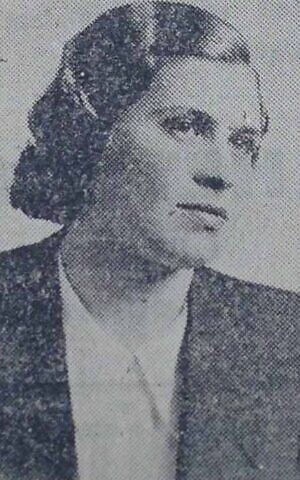
Hedwig Bercu hid for 18 months in Jersey, then married the German soldier who helped keep her hidden. (Yad Vashem Righteous Among the Nations Collection)
Soon after, the Nazis demanded the Channel Island authorities implement the first of a raft of anti-Semitic measures, including a requirement that all Jews must register.
Bercu was among the handful of Jews who registered on Jersey. Much of the islands’ small Jewish population had been evacuated to Britain, but at least 30 Jews are believed to have remained at the start of the German invasion. Bercu did, however, attempt to lie to the chief aliens officer, Clifford Orange, and persuade him that she did not know who her father was and that her mother was a Protestant who had only converted to Judaism after marrying a Romanian Jew. Orange nonetheless registered her as Jewish, while, as files revealed in 1995 showed, meticulously recording her story.
Despite her registration, Bercu attained work as an interpreter with a German transport unit in 1942 — the same year that her relationship with Rümmele began.
“How Hedwig came to be employed by the Germans as a registered Jew is unknown,” Carr writes in a recently published paper. “One can only assume that nobody checked her paperwork. As she was tall and blond, her appearance did not fit Nazi stereotypes of Jews, and thus did not arouse suspicion.”
“It’s all a bit of a mystery,” Carr told The Times of Israel. “There’s a lot that we just don’t know.”
What else we don’t know
Bercu’s registration could have proved a death sentence. Three other foreign-born Jewish women, Marianne Grunfeld, Therese Steiner and Auguste Spitz were deported from Guernsey in 1942 and later murdered at Auschwitz.

Channel Islands occupation expert Dr. Gillian Carr. (Courtesy)
Bercu, however, escaped deportations carried out in 1942 and 1943. The reason why, suggests Carr, is another mystery.
“Ultimately, it seems probable that she was protected by someone in a position of authority or influence,” Carr says in her paper. “As Rümmele apparently started his relationship with Hedwig in mid-1942, we cannot necessarily look to him as her guardian angel at the time of the first deportation (unless he had had his eye on her before beginning their relationship). His influence is the most likely explanation during the second deportation, although the risks for him were also great.”
Her work for the Germans gave Bercu access to a then-much prized commodity: petrol coupons. She began stealing them and passing the coupons to doctors who desperately needed them to do their work. “It’s an atonement, for taking wages from the Krauts. My own personal mitzvah,” Bercu tells an astonished Rümmele in “Hedy’s War.”
It is not known whether Bercu went into hiding because the Germans had discovered her theft of the coupons or because she feared a roundup of Jews.
One possibility is that she was threatened by an English-speaking fellow employee at the Organization Todt — possibly, Lecoat suggests in the book, an Irish mercenary — who knew about, and was involved with, her theft of the coupons.
“There’s various different accounts, but the one that I went with is that he threatened to expose her if she didn’t assist him,” Lecoat says. “Whatever happened in that conversation, Hedy realized that the game was up and that she was in serious trouble, and that was when she went into hiding.”
A death badly staged
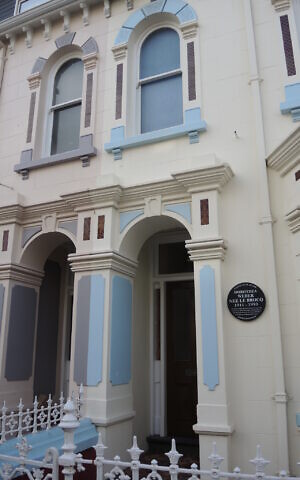
The house where Dorothea Weber sheltered Hedwig Bercu. (Courtesy Dr. Gillian Carr)
After staying briefly with a Czechoslovak friend, Bercu moved into Weber’s home at 7 West Park Avenue in St. Helier.
But Bercu’s attempt to trick the Germans into believing she was dead by staging her own suicide — she left a note and pile of clothes at St Aubin’s beach — did not succeed.
In late November, a notice appeared in the local newspaper under her photograph announcing that the Germans were seeking Bercu’s whereabouts. Any information would, it read, would be treated by the Feldkommandantur in the “strictest confidence.” “Anyone concealing Miss Bercu or aiding her in any other manner makes himself liable to punishment,” the notice grimly concluded.
In August 1944, the Germans sent a list of 18 missing persons, including Bercu, to the local police, and ordered a “more energetic search” for them.
A search of St. Helier for Bercu provides one of the tensest moments in Lecoat’s book. In it, Rümmele dresses her in a German uniform and the pair wander the streets together until the danger passes.
“Hiding in plain sight is the one thing they won’t be looking for,” Rümmele says in the book.
The story is contained in an unpublished memoir by Bercu’s brother, sections of which were obtained by Carr. “It is hard to know whether this remarkable anecdote is true,” the academic writes, suggesting that the only certainty is that “the escapade would have been extraordinarily risky for them both.”
What is clear, believes Lecoat, is that Bercu “very likely wouldn’t have survived the war without Kurt’s assistance and that’s probably also true for Dorothea.”
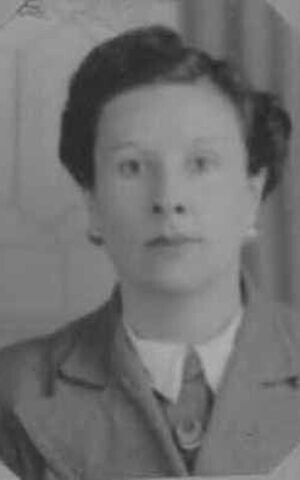
Dorothea Weber hid Hedwig Bercu in her home for 18 months, sharing her meager rations to keep her alive. (Yad Vashem Righteous Among the Nations Collection)
There is a deliberate air of claustrophobia that hangs over Lecoat’s novel.
“You are literally trapped in these tiny places… It was impossible to get on or off the island, and there was nowhere to hide; there’s no forests there,” she says. “The slave workers who escaped were hid in private houses because that was the only place that they could go. It’s a very unique situation, it’s a very unique occupation.”
Lecoat says that the character of Bercu that she portrays in the book is constructed from the key elements of her life that are known to be true: a young woman who traveled alone across Europe, made a life for herself in Jersey, and then both worked for, and stole from, the Germans.
“This is a woman who is incredibly strong in many ways,” says Lecoat. “I spoke to somebody who knew her — who was a child at that point in Jersey — and he said that he felt her to be a very strong-minded person, someone who was very sure of what was right and wrong. I thought that that makes sense to me, and we know that she must have been tough.”
The romances
It isn’t known how Rümmele and Bercu met — although it may well have been through her work as an interpreter — or when the German officer found out she was Jewish. In the book, Lecoat characterizes the early stages of Bercu’s relationship with Rümmele as “a psychotic pendulum of joy and self-hatred.”
“I don’t know how that relationship came about, but I can’t imagine that she didn’t go into it without some enormous degree of guilt and internal conflict herself,” the author says. “She was worried enough and scared enough of the Nazis to have fled to the other side of the continent to get away from them.”
Nonetheless, she continues, “there must have been something in Kurt that she realized was different; she must have just sensed that.”

‘Hedy’s War,’ by Jenny Lecoat. (Courtesy)
But it is Weber — the woman who takes Bercu in and shares her meager rations with her for 18 months — who Lecoat believes has the “moral authority of the whole book.”
“She acts completely selflessly, with no consideration for her own safety, knowing exactly the risks that she’s taking,” Lecoat says. Although undoubtedly brave, the novel paints her initially as a somewhat unworldly character, a reflection of the “pretty sheltered island lives” led by Jersey’s inhabitants even in the decades immediately after the war.
Like Bercu, though, Weber is portrayed as having enormous strength of character. Her marriage to Anton Weber, a baker who left Austria three weeks before the Anschluss but who was conscripted into the Reich army in 1942, led to her being ostracized by her family. Carr’s search of the records show none of them attended Weber’s wedding in 1941, an indication that she might have been seen as a “Jerrybag,” the derisive term used to describe local women who were suspected of becoming romantically involved with the Germans.
Weber’s motives for sheltering Bercu are impossible to know for certain, as is how the two women first met
Carr believes that Weber’s motives for sheltering Bercu are impossible to know for certain, as is how the two women first met. Having suffered the stigma of being illegitimate and a “Jerrybag,” she may have felt a particular affinity for a woman she felt was being “unfairly persecuted,” Carr speculates. It is also possible, she writes, that Rümmele approached Weber, as the wife of a fellow German soldier, or that Anton Weber and Bercu’s shared Austrian background played a part.
Of course, Carr argues, “Dorothea may have taken Hedwig in simply out of moral obligation and compassion” or a “desire to defy the occupiers.”
Anton Weber was also aware that his wife was sheltering Bercu, having returned to the islands on leave during the period she was staying at 7 West Park Avenue. The academic is certain, however, that Weber was not motivated by financial considerations, given that Bercu lacked the money to even pay for her board and lodgings.
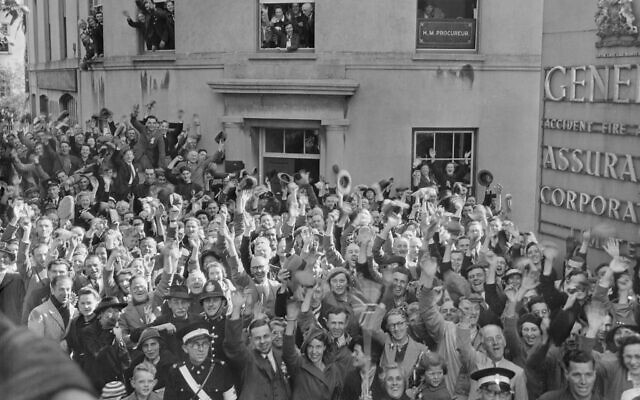
Crowds greet British troops in Guernsey in May 1945. (Wikimedia Commons)
By the time of the Channel Islands’ liberation in May 1945, Weber had been informed by the German authorities that her husband — from whom she had not heard since the previous spring — was presumed dead. Three months later, she married a British soldier, Francis Flanagan, and moved to London.
However, Anton Weber has not perished on the eastern front but had instead been taken prisoner. In 1949, on hearing his wife had remarried, he returned to Jersey, leading to Weber and her new husband being charged and tried for bigamy. Weber received one year’s probation and little is known about her later life. She died in 1993.
Rümmele too became a prisoner of war and was interned in England. After his release, he and Bercu — who converted to Protestantism — married in 1949 and settled in his native Germany. Their marriage was, sadly, a short one: Rümmele died aged 38 in 1956 after undergoing a surgical procedure. Bercu and the couple’s three children remained in Germany. Her daughter, Marion Oberer-Rümmele, told the BBC in 2016 that Bercu had never revealed to her children what had occurred in Jersey.
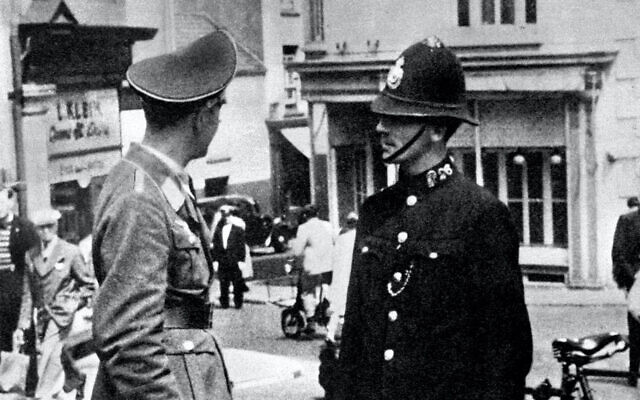
Illustrative: A German Luftwaffe officer, left, speaks with a British policeman in St. Helier, the capital of Jersey, during the German occupation of the Channel Islands. (PA Images via Getty Images, JTA)
“It’s an amazing story; sometimes it makes me angry that she never spoke to us about it. It was absolutely incredible what both of my parents went through, they were so brave,” Oberer-Rümmele said.
In 1960, Bercu was reunited with her brother, Josef Goldenberg, who had escaped to Palestine from Austria. However, as Carr discovered, she attempted to maintain a veil of secrecy about her background.
“Josef and his family regularly visited, and she and the children sometimes travelled to Israel to meet more of the family,” she writes. “Hedwig forbade her Israeli family members from telling her children about their Jewish heritage, but with time her children began to ask questions. Josef eventually told them the truth, but made them swear never to tell Hedwig that they knew her secret.”
But, however painful the past, Bercu did not forget her debt to Weber.
“We will never forget her and the great risks she took on our behalf,” Bercu said in a message which was read out at a 1998 Jersey memorial service to Jews and those who had assisted them. “With gratitude we remember her sacrifice, and say thank you, Dorothy, from all our hearts. We survived only through your help and courage.”
Related posts:
Views: 0
 RSS Feed
RSS Feed

















 November 21st, 2020
November 21st, 2020  Awake Goy
Awake Goy  Posted in
Posted in  Tags:
Tags: 
















